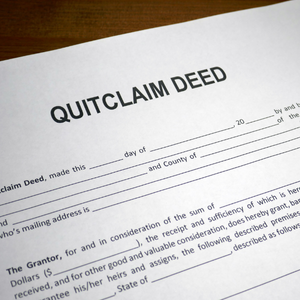
Understanding Quitclaim Deeds: A Comprehensive Overview
A quitclaim deed is an essential legal document used in Fort Worth, TX, that allows for the transfer of real estate ownership without providing any warranties. Anyone engaged in real estate dealings ought to know the nuances of a quitclaim deed.
Unlike warranty deeds, which promise a clear title, quitclaim deeds simply transfer any interest a grantor holds at the time of transfer. This is especially beneficial in transfer cases involving family members or soon-to-be ex-spouses or to resolve title-related disputes involving friends or associates.
The most common cases where quitclaim deeds are required are removing or adding someone to a title or correcting mistakes in existing deeds. Just like the rest of Texas, Fort Worth requires the grantor to sign a quitclaim deed in the presence of a notary public, and the deed must contain the requisite legal descriptions.
Although quitclaim deeds are simple, they must be drafted with care to ensure that the interest in question is adequately conveyed and there are no future disputes. After the deed has been executed, filing it with the Tarrant County Clerk’s Office is important to complete the ownership transfer and ensure the property title records are accurate.
Such knowledge can allow property owners working out real estate dealings within Fort Worth to be more proficient and bold in maneuvering through different transactions, predominantly when guided by Hilltop Home Buyer.
Comprehensive Guide to Filing a Quitclaim Deed in Texas
‘The process of filling out a quitclaim deed in Texas, specifically in Fort Worth, involves several steps which, when followed, will result in a legally enforceable document which will accurately reflect the intent of the parties involved.’ First, understanding a quitclaim deed is imperative. This deed is a document that conveys an interest in a property; however, there is no guarantee that the title is free of encumbrances.
The property’s current owner, which is the grantor in this deed, must fill in the deed with correct names, addresses, and a legal description of the property. After this information is accurately filled out, the deed will require both parties’ notarized signatures for validation.
As with a number of other counties in the state, Fort Worth residents must submit the quitclaim deed to the relevant county clerk’s office for filing to make the deed officially executable. It is vital to submit payment for the recording fee and meet all local submission requirements, as these are common prerequisites for participation in the recording system.
Applying these steps will aid in achieving an efficient property transfer process in Fort Worth, Texas.
Step-by-step Process for Filing a Quitclaim Deed in Fort Worth, TX

As with every other jurisdiction in the United States, Fort Worth, TX, has its own procedures for filing a quitclaim deed. In Fort Worth, as in other locations, a quitclaim deed filing is the same as a property deed filing in the sense that the appropriate jurisdiction and procedures must be followed. The first step is to get a quitclaim deed form, available at legal form websites and office supply stores.
You must be careful who the property grantor and grantee are, as their errors could lead to legal and financial complications. Make sure that a clear and specific property description is added in the form.
The deed must be signed by the grantor and the grantee in front of a notary public. After notarization, the quitclaim deed must be taken to the Tarrant County Clerk’s Office for filing. The relevant information is then updated in the publicly available records.
You will be charged a fee for recording the quitclaim deed. While the Clerk’s Office is open for walk-ins, it is a good idea to get in touch with them so that you know any filing prerequisites.
For your reference, make sure you keep receipts and relevant paperwork.
How to Prepare and Complete a Quitclaim Deed Form Correctly
To prepare and fill out a quitclaim deed form for real estate in Fort Worth, TX, specific processes must be followed to guarantee legal completeness and precision. A quitclaim deed form may be acquired at a local title company or law firm and retrieved online on Texas document websites.
Make sure all important participants are clearly detailed: a grantor, who gives up the property interest, and a grantee, who receives it. Also, the property that is the subject of the transaction should be detailed, and its full legal description as contained in the existing deeds and tax records must be included.
The description must be consistent with the records at the Tarrant County Clerk’s office to avoid discrepancies. For legal validation of the document, the grantor must notarize the deed to the grantor’s interest.
It is highly recommended that both parties consult an attorney to resolve issues arising from the form. The quitclaim deed should be filed immediately after notarization with the Tarrant County Clerk’s office in Fort Worth to update the records in the register and hence effect change in the ownership rights.
Proper attention to these details guarantees that the conveyance of property using a quitclaim deed is seamless and legally compliant in Fort Worth.
Common Mistakes to Avoid When Filing a Quitclaim Deed in Fort Worth, TX
Avoiding mistakes that could invalidate the deed transfer is crucial when filing a quitclaim deed for real estate in Fort Worth, TX. A common mistake is omitting the grantor and grantee that identify the parties correctly, which risks ownership disputes.
Legal disputes could arise if the parties involved do not ensure that all names are spelled correctly and match the existing records. Omitting a complete legal description, alongside vague and incorrect descriptions, is another oversight that could render the deed ineffective.
In Texas, quitclaim deeds must be notarized. Failure to notarize the document will render it legally deficient, inhibiting its intended purpose. The same is true for failing to record the deed with the Tarrant County Clerk’s Office; the transfer would be in limbo and open to contest.
Not having liens on a property is essential for executing a quitclaim deed, as it might impact the parties involved. Scrutinizing these details will ensure a smooth, legally accurate transfer of property ownership through a quitclaim deed in Fort Worth.
Role of Notarization in Executing a Valid Quitclaim Deed
Notarization is a crucial step when dealing with quitclaim deeds in real estate transactions in Fort Worth, TX. As with any legal document, quitclaim deeds require notarization to confirm their legal authenticity.
Notaries public witness the parties signing the document and confirm that the individual is the real person signing the document. This process mitigates the signing of fraudulent documents, as the notary public will ensure that the grantor who claims to be signing the quitclaim deed is and has not been coerced into doing so.
In Fort Worth, Texas, the deed cannot be filed in the Tarrant County Clerk’s office without being notarized. Thus, notarizing the quitclaim deed confirms its authenticity and eliminates the chances of disputes and legal battles concerning the property’s ownership.
In transactions wherein a quitclaim deed is used, notarization increases the security sought by both the grantor and the grantee.
Costs Involved in Filing and Recording a Quitclaim Deed in Fort Worth, TX
Property owners in Fort Worth, Texas, must consider the costs of filing and recording a quitclaim deed. This includes the recording fee with the Tarrant County Clerk’s Office, which is charged per document page. Also, there are costs associated with notarizing the document.
Unlike a warranty deed, a quitclaim deed does not require a real estate attorney; however, it is advisable to seek professional help to avoid the burden of drafting a deed in the future. The expense of sought-after lawyers inevitably brings great ease of mind, ensuring that all legal matters are dealt with and settled efficiently. Other legal issues, such as a title search, may come up, but more often than not, these are rare when it comes to simple transactions, such as quitclaim deeds involving family members.
People filing a quitclaim deed should understand the different costs and avoid the surprise of paying extra while transferring property ownership in Fort Worth. The straightforward nature of filing the deed helps in saving finances.
Where Do I File a Quit Claim Deed in Texas?
Understanding the correct processes and venues for submission is critical for filing quit claim deeds related to real estate in Fort Worth, Texas. One such submission location is the Tarrant County Clerk’s Office, which serves Fort Worth residents.
All real estate records, such as quitclaim deeds, are recorded at the Clerk’s Office. To achieve the legal requirements for a quitclaim deed, the deed must be notarized and all fees paid.
Visiting the Tarrant County Clerk’s Office and Website would be the best option for real-time information related to filing requirements. Ensuring the quit claim deed is recorded aids in protecting and maintaining the Fort Worth resident’s ownership.
How Much Does It Cost to File a Quit Claim Deed in Texas?

As with any legal document, filing a quitclaim deed in Fort Worth, Texas, is expensive. One should consider the recording fee charged by the county clerk.
As for Fort Worth and its surrounding county, Tarrant, it is not uncommon for fees to be set outside of $26 to $30 for the first page of the filed document, with a few extra dollars for each page surrendered. Your local county clerk’s office is the best place to call to ensure you have the most recent fees, since they can change immediately.
Suppose you hire a lawyer or legal aide to review or prepare the quitclaim deed. In that case, there is a strong chance that you will have to pay extra on top of the already professional few hundred dollars due to the complexity of the document. Many individuals prepare it themselves and look for templates to cut down on the costs of filing the quitclaim deed.
Saving money by not preparing the quitclaim deed isn’t the end of the story. The importance of Texas property law, accuracy, and legal compliance should not be overlooked, as downgrading these can have severe long-term repercussions. Understanding these fees can ensure a seamless budget when filing a quitclaim deed in Fort Worth, Texas.
Where to File a Deed in Tarrant County?
Filing a quitclaim deed regarding real estate in Fort Worth, TX, requires particular attention to detail on where to submit the documents within Tarrant County. The Tarrant County Clerk’s Office is the primary location for filing a deed in Tarrant County.
This office also records real estate transactions, including quitclaim deeds. To have your quitclaim deed recorded, you must go to the Tarrant County Courthouse, located at 100 West Weatherford Street, Fort Worth, TX.
For specific filing requirements, including payment options and additional documents, it is best to check the Tarrant County Clerk’s website or contact their office directly. Ensure timely and accurate recording of your quitclaim deed to legally transfer property rights and protect against future disputes concerning ownership within Fort Worth and Tarrant County.
How to Fill Out a Quit-Claim Deed in Texas?
Completing a quitclaim deed for property in Fort Worth, Texas, requires specific procedures. First, like any other form, Texas has its own prescribed standard quitclaim deed, which you must obtain.
Enter the grantor’s full name in the appropriate box. As the person transferring an interest in property, you are the grantor while the recipient is the grantee. Remember that the original deed’s legal description of the property must align with the one utilized, which can be accessed at the Tarrant County Clerk’s office or their online portal.
The document’s heading must be “Transfer of No Warrant Deed,” meaning interest can be transferred, but no warranties can be given. Including this clause protects both parties in the transaction.
The execution of a deed in Texas requires notarization, meaning both parties must appear before a notary public with a quitclaim deed form that requires their signatures. After notarization, ensure the Tarrant County Clerk’s office receives the form for public records.
Your transaction is done after this last step, which updates the public records of the property in Fort Worth to reflect the new legal owner.
Resolving Disputes Arising From Faulty or Invalid Quitclaim Deeds in Fort Worth, TX
In Fort Worth, TX, understanding the remedies for dealing with faulty or invalid quitclaim deeds requires understanding the best legal methods to resolve the dispute. A quitclaim deed gives up any interest the owner has in the property, which is common in real estate dealings.
In relation to real estate transactions, the absence of warranties can invite disputes, especially where undisclosed liens or claims exist on the property because the warranty does not describe the property in full. To resolve these disputes, it might be helpful for the parties to try mediation.
If these mediation methods do not work, legal measures can be taken by applying to the court to resolve the ownership disputes and remedy the errors in the deed. This is mostly an all-or-nothing approach, so the parties need to get good legal representation, in this case, real estate lawyers, to assist them with applying the property laws in Texas and help them submit the required paperwork so they do not face issues in the future.
Knowledge of the issues surrounding the quitclaim deeds can be more productive if people learn how the issues are resolved and how title insurance offers protection against a claim, especially if they plan to sell their home for cash in Keller or nearby cities.
Legal Assistance and Resources for Drafting a Quitclaim Document in Fort Worth, TX
Obtaining the correct legal help and materials when drafting a quitclaim deed for real estate in Fort Worth, TX, is necessary for achieving precision and upholding the law of Texas. A proficient attorney, for instance, a real estate attorney, aids significantly in ensuring all intricacies of the deed, including the rights of a property owner and the necessary processes to transfer ownership, are within the applicable Texas statutes.
As experts in the field, these attorneys ensure that the quitclaim deed and all other legal papers are prepared according to Texas law, thereby protecting the client’s legal rights and interests. In addition, some legal aid websites offer templates and instructions for drafting deeds, which is very helpful.
However, in Texas, ensuring the information received is credible is imperative. In this regard, some offices, such as the Fort Worth office of the Tarrant County Clerk, aid in this as they have a wealth of materials, from the needed forms to the requirements for filing them, that ensure compliance with Fort Worth legal processes.
The fusion of the two forms of aid elaborated, that is, legal aid websites and real estate attorneys, serves to great effect in filing quitclaim deeds for real estate.
Frequently Asked Questions About Quitclaim Deeds Explained
Like many other forms of property deeds, a quitclaim deed has certain features and limitations. Understanding these features is necessary to use quitclaim deeds effectively and within the limits of applicable laws in Fort Worth, TX. In simple terms, a quitclaim deed allows an individual to transfer ownership interest in property without guaranteeing the title is clear.
The deed is mainly utilized in family relations, divorce proceedings, and settling discrepancies related to the property title. One of the most common questions is whether, with the use of a quitclaim deed, a property’s existing mortgage is still applicable and whether the deed affects it in any way.
Many are interested in the speed at which a quitclaim deed may be processed. In Fort Worth, as with many other jurisdictions, a property is notarized and signed, in which case the deed should be filed with the Tarrant County Clerk’s Office to ensure it is placed in the public record. Improper filing may affect the legal effectiveness of the deed. Understanding Texas laws raises questions about tax laws, especially if the deed has the potential to be considered a gift.
Comprehension of quitclaim deeds aids in grasping intricate laws within Texas and legislation supporting property and deeds.
What Is the Best Way to Do a Quitclaim Deed?

When contemplating how best to file a quitclaim deed for real estate in Fort Worth, TX, it is advisable to take a methodical approach to ensure the procedure is complete and complies with the law. Search for Texas-specific legal websites or visit local offices to get the quitclaim deed form.
In the form, ensure that all the details regarding the property and the participants, as well as their names and addresses, are entered correctly and are consistent with existing records. In addition, make sure that the grantor signs the form and all grantees sign the deed in the presence of a notary public.
Verifying the deed is necessary, so it is essential to go through notary procedures. Understanding Quitclaim Deeds: A Comprehensive Overview. A quitclaim deed is an important legal document used in Fort Worth, TX, allowing the transfer.
Attention to detail regarding accurate payment of fees and information provided guarantees a seamless transfer. Guidance from a real estate lawyer or title company is advisable, in addition to this article, in case any additional measures are necessary, counter to the challenges presented when executing a quitclaim deed in Fort Worth, Texas, especially if you plan to sell your home for cash in Fort Worth or nearby cities.
What Are the Disadvantages of a Quitclaim Deed?
It is essential to realize the possible downsides of using quitclaim deeds in real estate transactions in Fort Worth, TX. One significant disadvantage is the absence of any warranty or guarantee concerning the title.
Unlike other deeds, which ensure a clear title and future protection against claims, a quitclaim deed simply conveys whatever interest the grantor possesses, without any verification. Thus, unresolved liens, encumbrances, or ownership interests may be concealed in the background.
Furthermore, the buyer is stuck with a higher risk of loss due to the absence of title search and insurance. In Fort Worth, where the real estate market is very competitive, a lack of assurances and security is a recipe for legal troubles or financial loss when reclaiming property title issues arise post-transfer.
Thus, while quick and easy, a quitclaim deed’s simplicity may be appealing, it invites risk and needs extra precautions, independent title searches, to ensure protection against the potential pitfalls of such transactions.
Do you need to file a quitclaim deed? Whether you’re transferring property to a family member, finalizing a divorce settlement, or making other ownership changes, Hilltop Home Buyer is here to help. We guide you through every step of the quitclaim deed filing process, ensure all documents are prepared correctly, and make the transaction seamless. Ready to get started or have questions? Contact us at (833) 962-2274 for expert assistance. File your quitclaim deed today!
Helpful Fort Worth Blogs

| DEEDED | LEGAL SERVICES | LAWYER | HELD IN TRUST | TRUST LAW | GENERAL WARRANTY DEED |
| DEED OF TRUST | TRUST DEEDS | REAL ESTATE LAWYERS | LIFE ESTATE | LADY BIRD DEED | LIFE TENANT |
| FORECLOSE | NON-JUDICIAL FORECLOSURE | FORECLOSURE | FORECLOSURE SALE | CONTRACT | LENDER |
| LEGAL ASSISTANCE | TENANTS IN COMMON | JTWROS | SURVIVORSHIP | JOINT TENANTS | JOINT TENANCY WITH RIGHT OF SURVIVORSHIP |
| ADOBE | ADOBE SYSTEMS INCORPORATED | LEGAL DOCUMENTS | PRINCIPAL | DEBT | PLLC |
| LITIGATION | HEIRS | HEIRSHIP | DEED IN LIEU OF FORECLOSURE | PROBATE | |
| ADOBE PDF | LICENSING | LICENSE | LIABLE | LIABILITY | LEGAL ADVISOR |
| LEGAL ADVICE | TENANCY | LANGUAGE | AFFIDAVIT | TERMS OF USE | |
| PRIVACY | PRICING | MORTGAGE LENDER | HOME MORTGAGE | MANAGEMENT | JURISDICTIONS |
| EXPERT | EXECUTOR | DEEDS IN TEXAS | SPECIAL WARRANTY DEED |
